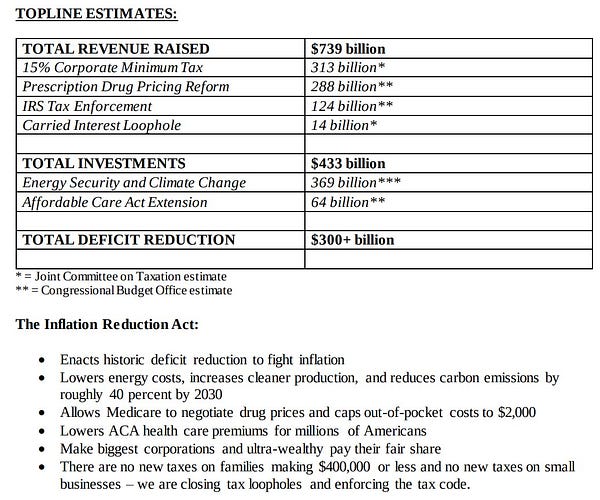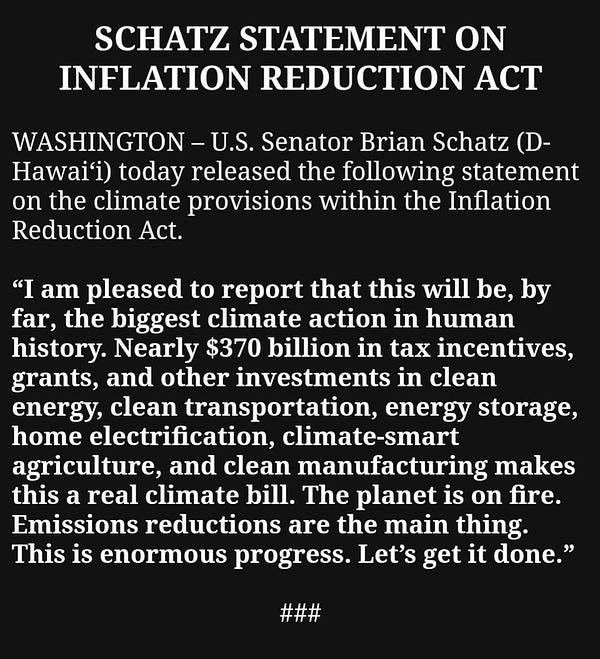President Biden tested negative for coronavirus today and is back at work in public. He used the opportunity to reiterate the importance of vaccines (in a way that certainly irritated the former president, who always hated the idea he was weak or sick):
“When my predecessor got COVID,” Biden said, “he had to get helicoptered to Walter Reed Medical Center. He was severely ill. Thankfully, he recovered. When I got COVID, I worked from upstairs of the White House… for the five-day period. The difference is vaccinations, of course, but also three new tools, free to all and widely available. You don't need to be president to get these tools to use for your defense. In fact, the same booster shots, the same at-home tests, the same treatment that I got is available to you.”
Today was a huge day in the Senate.
First, the Senate passed the Creating Helpful Incentives to Produce Semiconductors (CHIPS) bill, which appropriates $280 billion to speed up the manufacturing of semiconductors in the U.S. and to invest in scientific research and development in computers, artificial intelligence, and so on. The pandemic made it clear that permitting chip manufacturing to migrate to Asia left the U.S. at a disadvantage when supply chains are disrupted. Chip shortages caused shortages of a wide range of products that use electronics, and the shortages have been key in driving up the prices that are feeding inflation.
The investment will boost manufacturing and scientific industries, providing good jobs. It appropriates $52 billion in subsidies and tax credits for chip manufacturing and $200 billion for research and development. It includes workforce training and educational emphasis on computer training, and it sanctions China for human rights and cybersecurity offenses. The measure passed the Senate with a strong bipartisan vote of 64 to 33, giving it the 60 votes it needed to overcome a Republican filibuster. Seventeen Republicans joined the Democrats to pass the bill, either because they are worried about competing with China or because they are eager to increase production in the U.S.
The bill was a top priority for the Biden administration, and it looks as if the House will pass it and send it to the president’s desk.
Negotiations over the bill have been going on since May and appeared to be on track until the end of June, when Senate minority leader Mitch McConnell (R-KY) threatened to pull all Republican support for it unless Democrats abandoned the idea of passing provisions for lower drug prices, taxes on the very wealthy, and climate proposals through a procedure called reconciliation, which cannot be filibustered.
That issue appeared solved on July 15, when Senator Joe Manchin (D-WV) indicated he would not support either climate measures or tax changes until the newest inflation numbers were released. Senator Todd Young (R-IN), a co-sponsor of the bill with Senate majority leader Chuck Schumer (D-NY) whipped Republicans to get the necessary votes, and today, McConnell voted in favor of the CHIPS bill.
Later today, Manchin released a statement announcing that he and Schumer had reached an agreement on a new piece of legislation called the Inflation Reduction Act of 2022. Framing the legislation largely as designed to address the deficit, Manchin’s statement also addressed the issues of taxes and climate change.
“Tax fairness is vital to our nation’s economic future,” he wrote, and it is “wrong that some of America’s largest companies pay nothing in taxes while freely enjoying the benefits of our nation’s military security, infrastructure and rule of law. It is commonsense that a domestic corporate minimum tax of 15 percent be applied only to billion-dollar companies or larger ensuring that America’s largest businesses are no longer able to operate for free in our economy.” He also spoke out against the carried interest loophole, which permits investment managers to take their compensation as capital gains rather than income, giving them a much lower tax rate. (Researchers suggest this could yield as much as $18 billion a year to the Treasury.)
Details on the new measure are still emerging, but it appears to be a $739 billion bill that includes price reforms for certain prescription drugs, lower premiums under the Affordable Care Act, money for the IRS to enforce tax laws, a corporate minimum tax, $369 billion of investment in climate and energy, and dramatic investment in reducing the deficit. There are no new taxes on families making less than $400,000 a year.
Manchin went out of his way to insist that Biden’s “Build Back Better” plan was dead and this was the new way forward. It seems likely Manchin was signaling to his red state constituents that he had not signed on to a program Democrats like, but there is much here that sounds like Biden, especially the tax plan. What is notably missing is investment in the social infrastructure of our nation that largely impacts women: childcare and eldercare.
After the Democratic senators were briefed on the proposal, Senator Brian Schatz of Hawaii said the measure would be “by far, the biggest climate action in human history. Nearly $370 billion in tax incentives, grants, and other investments in clean energy, clean transportation, energy storage, home electrification, climate-smart agriculture, and clean manufacturing makes this a real climate bill. The planet is on fire. Emissions reductions are the main thing. This is enormous progress. Let’s get it done.”
Biden immediately endorsed the measure. “This afternoon, I spoke with Senators Schumer and Manchin and offered my support for the agreement they have reached on a bill to fight inflation and lower costs for American families,” he said in a statement.
“With this agreement, we have a chance to make prescription drugs cheaper by allowing Medicare to negotiate lower prices and we can lower health insurance costs for 13 million Americans, by an average of $800 a year, for families covered under the Affordable Care Act.
“We will improve our energy security and tackle the climate crisis—by providing tax credits and investments for energy projects. This will create thousands of new jobs and help lower energy costs in the future.
“This bill will reduce the deficit beyond the record setting $1.7 trillion in deficit reduction we have already achieved this year, which will help fight inflation as well.
“And we will pay for all of this by requiring big corporations to pay their fair share of taxes, with no tax increases at all for families making under $400,000 a year.
“This is the action the American people have been waiting for. This addresses the problems of today—high health care costs and overall inflation—as well as investments in our energy security for the future.
“I will have more to say on this later. For now, I want to thank Senator Schumer and Senator Manchin for the extraordinary effort that it took to reach this result.
“If enacted, this legislation will be historic, and I urge the Senate to move on this bill as soon as possible, and for the House to follow as well.”
Tonight, Senate Republicans unexpectedly killed the Promise to Address Comprehensive Toxics (PACT) Act, which would have provided medical benefits for veterans exposed to burn pits and other toxins during their military service. The bill passed the Senate by a vote of 84 to 14 in June and had been sent back to that body for a procedural cleanup after the House passed it with the expectation that it would repass easily. Tonight’s vote is being widely interpreted as revenge for the resurrection of the reconciliation package.
Attacking our veterans out of spite might not be a winning move.
—
Notes:
https://www.reuters.com/world/us/us-lawmakers-open-formal-chips-china-bill-negotiations-2022-05-06/







Once again, the professor proves she's the master of the kicker ending. As in a kick in the face of Senate Republicans:
"Attacking our veterans out of spite might not be a winning move."
Killing a bill that would help Veterans, out of spite. The Republicans are despicable.